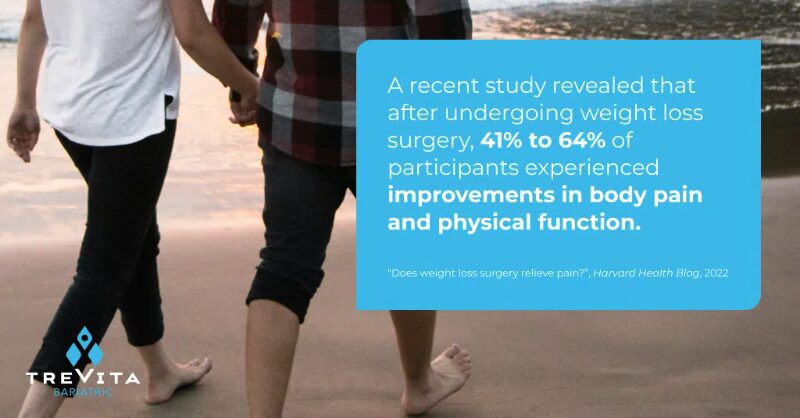Obesity is a significant global health issue that predisposes individuals to various serious medical and psychological conditions. It increases the risk of heart disease and other life-threatening illnesses. Managing obesity effectively can dramatically improve overall health and quality of life. This comprehensive guide explores the connection between obesity and related diseases, emphasizing how bariatric surgery, facilitated by TreVita Medical Tourism, offers comprehensive solutions.
The Impact of Obesity on Health
Obesity greatly increases the risk of numerous health issues that impair both physical and mental well-being. Here, we delve into how obesity is intricately linked with these conditions and provide key insights into the statistics.
Exploring the Diseases Linked to Obesity
Type 2 Diabetes:
Type 2 diabetes is a chronic condition characterized by high blood sugar levels due to the insulin resistance. Obesity is a significant risk factor of Type 2 Diabetes, as excess weight makes it challenging for cells to respond effectively to insulin, leading to elevated blood glucose levels. Nearly 90% of individuals with type 2 diabetes are either overweight or obese, which means weight management plays a crucial role in preventing or controlling this disease. Learn more about type 2 diabetes and how bariatric surgery can help here.
Hypertension:
Hypertension, also known as high blood pressure, is often linked to obesity due to the excessive adipose tissue that increases vascular resistance, putting additional strain on the heart and circulatory system. Obesity increases the risk of developing hypertension by 60%, significantly increasing the chances of stroke or heart disease. Discover how bariatric surgery can help reduce hypertension here.

Heart Disease:
Heart disease is a leading cause of death globally, particularly among obese individuals. Obesity exacerbates conditions like hypertension, high cholesterol, and metabolic syndrome, all of which contribute to the development of heart disease. Obese people have double the risk of developing heart disease, highlighting the importance of maintaining a healthy weight. Find out more about how weight loss surgery can help prevent heart disease here.
Osteoarthritis:
Osteoarthritis is a joint disease that worsens with excess weight, especially around the knees and hips. Extra weight increases pressure and wear on these joints, causing pain and inflammation. Obesity can double or triple the risk of osteoarthritis, making weight loss a crucial strategy for managing the condition. Learn how bariatric surgery can help ease osteoarthritis symptoms here.
Sleep Apnea:
Sleep apnea is a disorder in which breathing repeatedly stops and starts during sleep, often due to airway obstruction. Excess weight is a leading cause, as fatty deposits around the upper airway block airflow. About 45% of obese individuals have sleep apnea, underscoring the need for weight management. Read more about sleep apnea and its treatment here.
Fatty Liver Disease:
Non-alcoholic fatty liver disease (NAFLD) results from excessive fatty deposits in the liver and often progresses to more severe liver conditions. Obesity is a major contributor, with nearly 25% of the global population affected by NAFLD. Learn more about how weight loss surgery can help manage NAFLD here.
GERD:
Gastroesophageal reflux disease (GERD) occurs when stomach acid frequently flows back into the esophagus, irritating its lining. Obesity can increase intra-abdominal pressure, leading to acid reflux. Obese individuals are three times more likely to experience GERD. Learn how bariatric surgery can help alleviate GERD here.
Addressing Mental Health Issues Linked to Obesity
Obesity can severely impact mental health, leading to conditions like depression, anxiety, stress, and low self-esteem. Below we explore each aspect and how bariatric surgery can help:
Depression:
Obesity has a profound connection to depression, as social stigma and physical limitations can lead to persistent sadness and hopelessness. The Centers for Disease Control and Prevention (CDC) notes that obese individuals have a 55% increased risk of developing depression. Learn more about how bariatric surgery can help with depression here.

Anxiety:
Obesity often brings chronic stress and heightened anxiety due to societal pressures, limited mobility, and health risks. These factors can exacerbate or trigger anxiety disorders, which are more prevalent in obese populations. Explore how weight loss surgery can reduce anxiety here.
Stress:
Obesity increases physiological stress levels, impacting overall health. The burden of excessive weight can limit daily activities, create social pressures, and increase the risk of heart disease. Discover how bariatric surgery can help reduce stress here.
Low Self-Esteem:
Negative self-perception due to obesity can significantly diminish self-esteem, leading to social withdrawal and reduced quality of life. Low self-esteem is notably higher among obese individuals, affecting many aspects of their lives. See how weight loss surgery can improve self-esteem here.
How Bariatric Surgery Can Help
Bariatric surgery provides a comprehensive solution to many obesity-related conditions. By reducing the stomach’s size or rerouting the digestive system, weight loss surgery helps with food intake, alters eating habits, and promotes short- and long-term weight loss. This results in a healthier body mass index (BMI) and reduces the risk of heart disease, diabetes, and other life-threatening conditions. Moreover, it helps address mental health issues, as weight loss can improve self-esteem and alleviate the stress associated with being overweight or obese. With regular exercise and healthy eating habits, bariatric surgery can transform patients’ lives by enabling them to resume daily activities and pursue a better quality of life.
How Bariatric Surgery in Mexico Works
Mexico has emerged as a leading destination for bariatric surgery, offering high-quality medical care at affordable prices. Medical facilities are equipped with state-of-the-art technology, and surgeons specialize in various treatment options like gastric sleeve, gastric bypass surgery, and other life-changing procedures.
Centers for Disease Control guidelines ensure safe, efficient treatment, and shorter hospital stays make the recovery process smoother. Patients often arrive at the San Diego airport, and after a brief consultation, they undergo surgery, followed by personalized aftercare for their medical condition.
Why TreVita Medical Tourism Is the Best Option
TreVita Medical Tourism provides patients with comprehensive coordination, from managing appointments to helping them check in to the hotel. They also arrange transportation to the surgery center on the procedure day. This level of care extends to aftercare, where patients receive guidance from mental health professionals and experts in nutrition and exercise.
TreVita Medical Tourism makes weight loss surgery a stress-free experience, ensuring patients receive holistic support for successful short-term and long-term recovery. Their all-inclusive approach guarantees that patients not only feel confident in their treatment plan but also receive psychological encouragement, empowering them to live healthier, happier lives.
Conclusion
Obesity-related diseases and mental health issues pose significant challenges, but effective management through bariatric surgery offers a hopeful path forward. TreVita Medical Tourism provides access to comprehensive bariatric care in Mexico, helping patients reclaim their health and enhance their quality of life.

